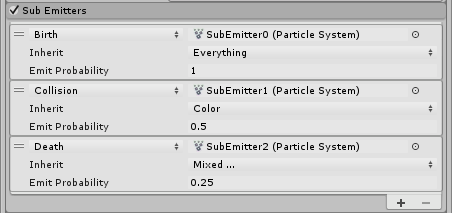Sub Emitters module
This module allows you to set up sub-emitters. These are additional particle emitters that are created at a particle’s position at certain stages of its lifetime.

Using the Sub Emitters module
This module is part of the Particle SystemA component that simulates fluid entities such as liquids, clouds and flames by generating and animating large numbers of small 2D images in the scene. More info
See in Glossary component. When you create a new Particle System GameObjectThe fundamental object in Unity scenes, which can represent characters, props, scenery, cameras, waypoints, and more. A GameObject’s functionality is defined by the Components attached to it. More info
See in Glossary, or add a Particle System component to an exiting GameObject, Unity adds the Sub Emitters module to the Particle System. By default, Unity disables this module. To create a new Particle System and enable this module:
- Click GameObject > Effects > Particle System.
- In the InspectorA Unity window that displays information about the currently selected GameObject, asset or project settings, allowing you to inspect and edit the values. More info
See in Glossary, find the Particle System component. - In the Particle System component, find the Sub Emitters module fold-out.
- To the left of the fold-out header, enable the checkbox.
API
Since this module is part of the Particle System component, you access it through the ParticleSystem class. For information on how to access it and change values at runtime, see the Sub Emitters module API documentation.
Properties
For some properties in this section, you can use different modes to set their value. For information on the modes you can use, see Varying properties over time.
| Property | Function |
|---|---|
| Sub Emitters | Configure a list of sub-emitters and select their trigger condition as well as what properties they inherit from their parent particles. |
Details
Many types of particles produce effects at different stages of their lifetimes that can also be implemented using Particle Systems. For example, a bullet might be accompanied by a puff of smoke powder as it leaves the gun barrel, and a fireball might explode on impact. You can use sub-emitters to create effects like these.
Sub-emitters are ordinary Particle System objects created in the SceneA Scene contains the environments and menus of your game. Think of each unique Scene file as a unique level. In each Scene, you place your environments, obstacles, and decorations, essentially designing and building your game in pieces. More info
See in Glossary or from PrefabsAn asset type that allows you to store a GameObject complete with components and properties. The prefab acts as a template from which you can create new object instances in the scene. More info
See in Glossary. This means that sub-emitters can have sub-emitters of their own (this type of arrangement can be useful for complex effects like fireworks). However, it is very easy to generate an enormous number of particles using sub-emitters, which can be resource intensive.
To trigger a sub-emitter, you can use these are the conditions:
- Birth: When the particles are created.
- CollisionA collision occurs when the physics engine detects that the colliders of two GameObjects make contact or overlap, when at least one has a Rigidbody component and is in motion. More info
See in Glossary: When the particles collide with an object. - Death: When the particles are destroyed.
-
Trigger: When the particles interact with a Trigger colliderAn invisible shape that is used to handle physical collisions for an object. A collider doesn’t need to be exactly the same shape as the object’s mesh - a rough approximation is often more efficient and indistinguishable in gameplay. More info
See in Glossary. - Manual: Only triggered when requested via script. See ParticleSystem.TriggerSubEmitter.
Note that the Collision, Trigger, Death and Manual events can only use burst emission in the Emission module.
Additionally, you can transfer properties from the parent particle to each newly created particle using the Inherit options. The transferrable properties are size, rotation, color and lifetime. To control how velocity is inherited, configure the Inherit Velocity module on the sub-emitter system.
It is also possible to configure a probability that a sub-emitter event will trigger, by setting the Emit Probability property. A value of 1 guarantees that the event will trigger, whereas lower values reduce the probability.